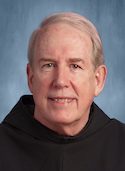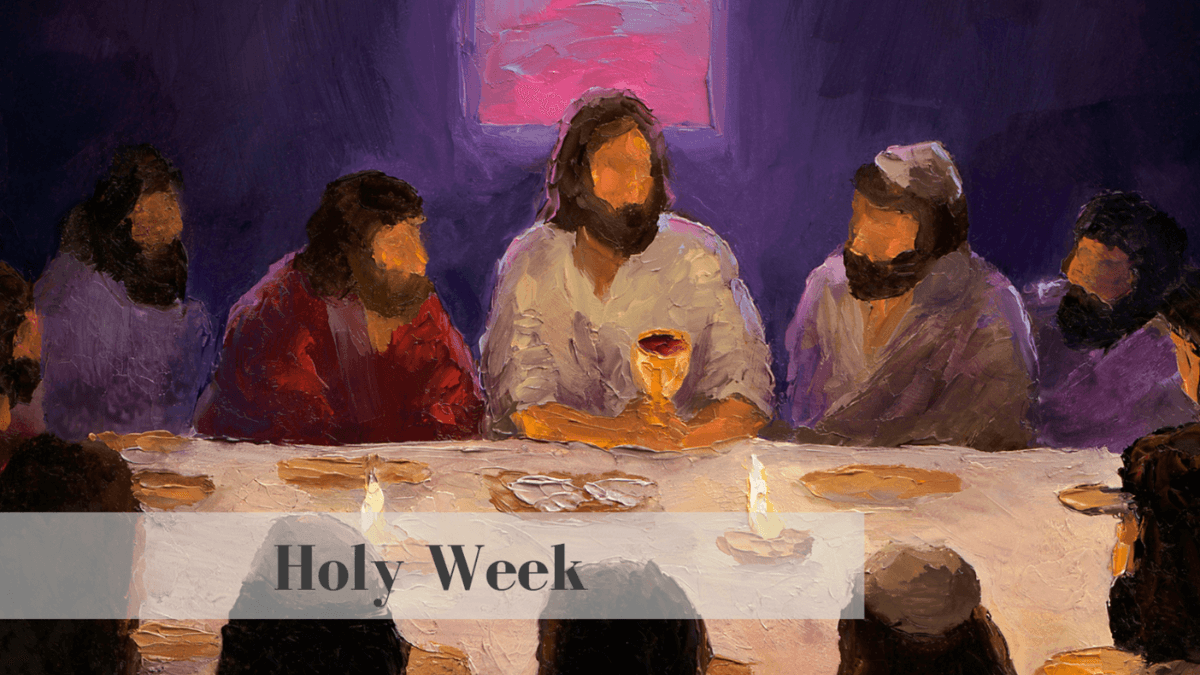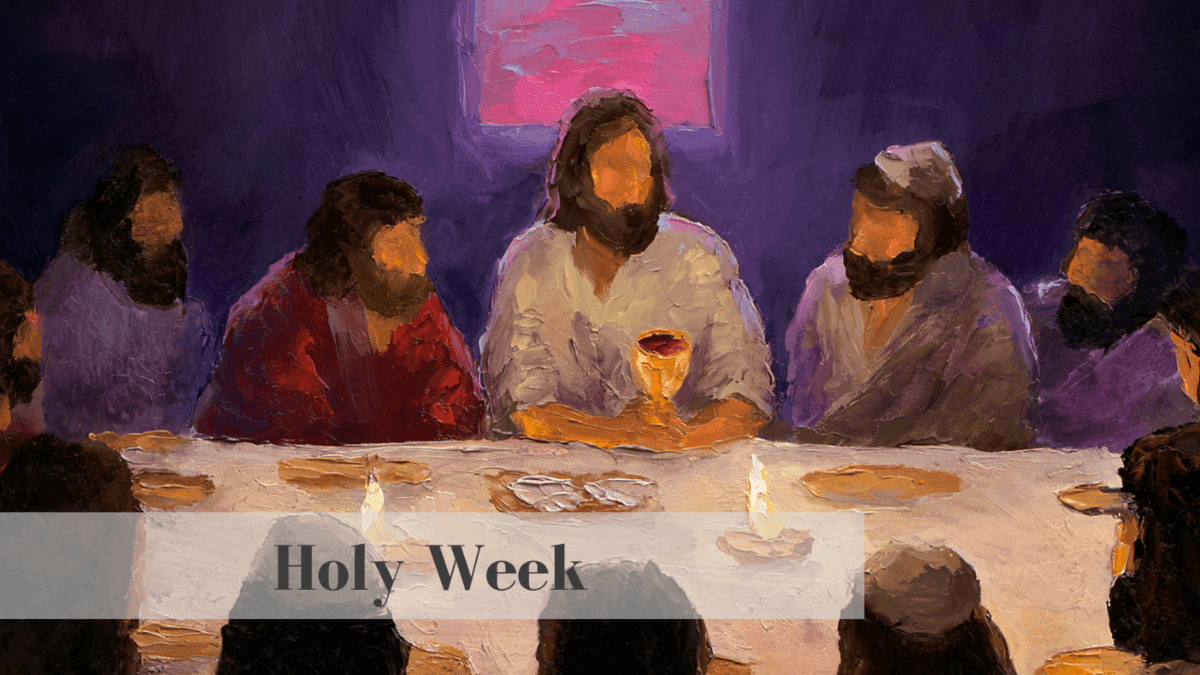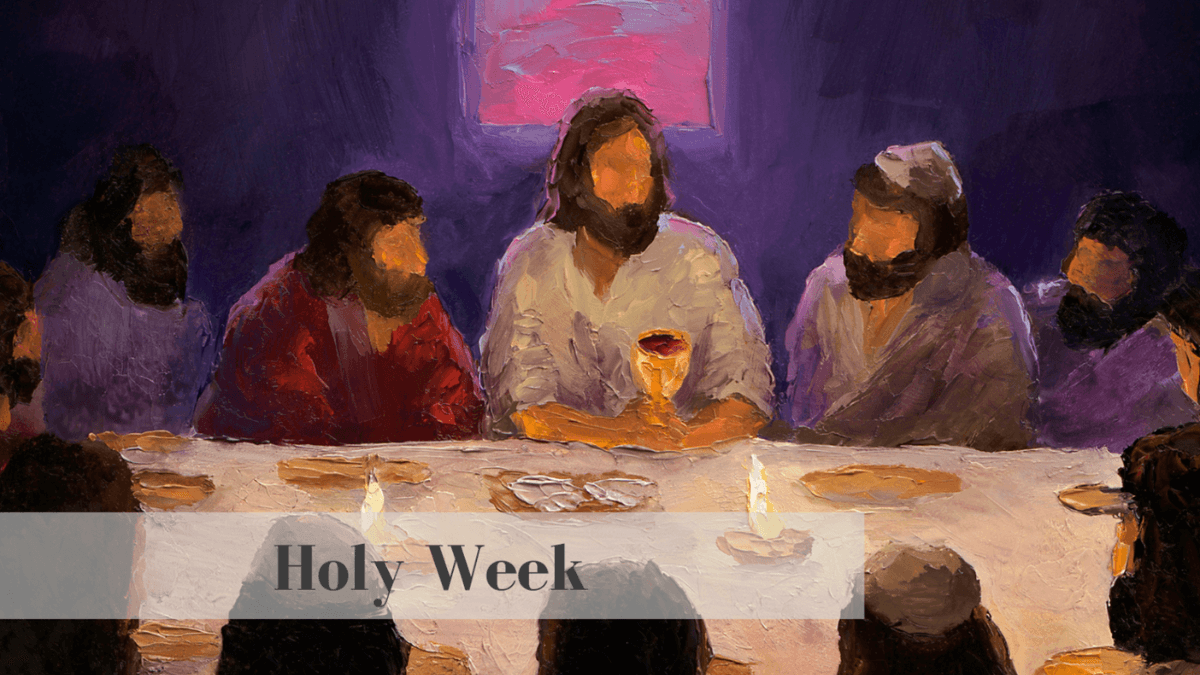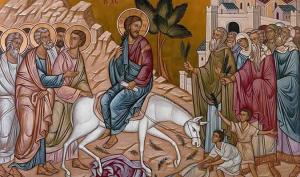John 20:19–25
19. Then the same day at evening, being the first day of the week, when the doors were shut where the disciples were assembled for fear of the Jews, came Jesus and stood in the midst, and saith unto them, Peace be unto you.
20. And when he had so said, he shewed unto them his hands and his side. Then were the disciples glad, when they saw the Lord.
21. Then said Jesus to them again, Peace be unto you: as my Father hath sent me, even so send I you.
22. And when he had said this, he breathed on them, and saith unto them, Receive ye the Holy Ghost:
23. Whose soever sins ye remit, they are remitted unto them; and whose soever sins ye retain, they are retained.
24. But Thomas, one of the twelve, called Didymus, was not with them when Jesus came.
25. The other disciples therefore said unto him, We have seen the Lord. But he said unto them, Except I shall see in his hands the print of the nails, and put my finger into the print of the nails, and thrust my hand into his side, I will not believe.
CHRYSOSTOM. (Hom. lxxxvi) The disciples, when they heard what Mary told them, were obliged either to disbelieve, or, if they believed, to grieve that He did not count them worthy to have the sight of Him. He did not let them however pass a whole day in such reflections, but in the midst of their longing trembling desires to see Him, presented Himself to them: Then the same day at evening, being the first day of the week, when the doors were shut where the disciples were assembled for fear of the Jews.
BEDE. Wherein is shewn the infirmity of the Apostles. They assembled with doors shut, through that same fear of the Jews, which had before scattered them: Came Jesus, and stood in the midst. He came in the evening, because they would be the most afraid at that time.
THEOPHYLACT. Or because He waited till all were assembled: and with shut doors, that he might shew how that in the very same way he had risen again, i. e. with the stone lying on the scpulchre.
AUGUSTINE. (Serm. cx. et cl. Pasch. aliquid simile.) Some are strongly indisposed to believe this miracle, and argue thus: If the same body rose again, which hung upon the Cross, how could that body enter through shut doors? But if thou comprehendest the mode, it is no miracle: when reason fails, then is faith edified.
AUGUSTINE. (Tr. cxx) The shut door did not hinder the body, wherein Divinity resided. He could enter without open doors, who was born without a violation of His mother’s virginity.
CHRYSOSTOM. (Hom. lxxxvi) It is wonderful that they did not think him a phantom. But Mary had provided against this, by the faith she had wrought in them. And He Himself too shewed Himself so openly, and strengthened their wavering minds by His voice: And saith unto them, Peace he unto you, i. e. Be not disturbed. Wherein too He reminds them of what He had said before His crucifixion; My peace I give to you; (c. 14:27; 16:33) and again, In Me ye shall have peace.
GREGORY. (Hom. xxvi. in Evang.) And because their faith wavered even with the material body before them, He shewed them His hands and side: And when He had said this, He shewed them His hands and His side.
AUGUSTINE. (Tr. cxxi) The nails had pierced His hands, the lance had pierced His side. For the healing of doubting hearts, the marks of the wounds were still preserved.
CHRYSOSTOM. (Hom. lxxxvi) And what He had promised before the crucifixion, I shall see you again, and your heart shall rejoice, is now fulfilled: Then were the disciples glad when they saw the Lord.
AUGUSTINE. (de Civ. Dei.) The glory, wherewith the righteous shall shine like the sun in the kingdom of their Father, i. e. in Christ’s body, we must believe to have been rather veiled than not to have been there at all. He accommodated His presence to man’s weak sight, and presented Himself in such form, as that His disciple could look at and recognise Him.
CHRYSOSTOM. (Hom. lxxxvi) All these things brought them to a most confident faith. As they were in endless war with the Jews, He says again, Then said Jesus unto them again, Peace be unto you.
BEDE. A repetition is a confirmation: whether He repeats it because the grace of love is twofold, or because He it is who made of twain one.
CHRYSOSTOM. (Hom. lxxxvi. 3) At the same time He shews the efficacy of the cross, by which He undoes all evil things, and gives all good things; which is peace. To the women above there was announced joy; for that sex was in sorrow, and had received the curse, In sorrow shalt thou bring forth. (Gen. 3:16) All hindrances then being removed, and every thing made straight, (πατωρθωται.) he adds, As My Father hath sent Me, even so send I you.
GREGORY. (Hom. xxii. in Evang.) The Father sent the Son, appointed Him to the work of redemption. He says therefore, As My Father hath sent Me, even so send I you; i. e. I love you, now that I send you to persecution, with the same love wherewith My Father loved Me, when He sent Me to My sufferings.
AUGUSTINE. (Tr. cxxi) We have learnt that the Son is equal to the Father: here He shews Himself Mediator; He Me, and I you.
CHRYSOSTOM. (Hom. lxxxvi. 2) Having then given them confidence by His own miracles, and appealing to Him who sent Him, He uses a prayer to the Father, but of His own authority gives them power: And when He had said thus, He breathed on them, and saith unto them, Receive ye the Holy Ghost.
AUGUSTINE. (iv. de Trin. c. xx) That corporeal breath was not the substance of the Holy Ghost, but to shew, by meet symbol, that the Holy Ghost proceeded not only from the Father, but the Son. For who would be so mad as to say, that it was one Spirit which He gave by breathing, and another which He sent after His ascension?
GREGORY. (Hom. xxvi.) But why is He first given to the disciples on earth, and afterwards sent from heaven? Because there are two commandments of love, to love God, and to love our neighbour. The spirit to love our neighbour is given on earth, the spirit to love God is given from heaven. As then love is one, and there are two commandments; so the Spirit is one, and there are two gifts of the Spirit. And the first is given by our Lord while yet upon earth, the second from heaven, because by the love of our neighbour we learn how to arrive at the love of God.
CHRYSOSTOM. (Hom. lxxxvi) Some say that by breathing He did not give them the Spirit, but made them meet to receive the Spirit. For if Daniel’s senses were so overpowered by the sight of the Angel, how would they have been overwhelmed in receiving that unutterable gift, if He had not first prepared them for it! It would not be wrong however to say that they received then the gift of a certain spiritual power, not to raise the dead and do miracles, but to remit sins: Whosesoever sins ye remit, they are remitted unto them, and whosesoever sins ye retain, they are retained.
AUGUSTINE. (Tr. cxxi. 3) The love of the Church, which is shed abroad in our hearts by the Holy Spirit, remits the sins of those who partake of it; but retains the sins of those who do not. Where then He has said, Receive ye the Holy Ghost, He instantly makes mention of the remission and retaining of sins.
GREGORY. (Hom. xxvi.) We must understand that those who first received the Holy Ghost, for innocence of life in themselves, and preaching to a few others, received it openly after the resurrection, that they might profit not a few only, but many. The disciples who were called to such works of humility, to what a height of glory are they led! Lo, not only have they salvation for themselves, but are admitted1 to the powers of the supreme Judgment-seat; so that, in the place of God, they retain some men’s sins, and remit others. Their place in the Church, the Bishops now hold; who receive the authority to bind, when they are admitted to the rank of government. Great the honour, but heavy the burden of the place. It is ill if one who knows not how to govern his own life, shall be judge of another’s.
CHRYSOSTOM. (Hom. lxxxvi. 4) A priest though he may have ordered well his own life, yet, if he have not exercised proper vigilance over others, is sent to hell with the evil doers. Wherefore, knowing the greatness of their danger, pay them all respect, even though they be not men of notable goodness. For they who are in rule, should not be judged by those who are under them. And their incorrectness of life will not at all invalidate what they do by commission from God. For not only cannot a priest, but not even angel or archangel, do any thing of themselves; the Father, Son, and Holy Ghost do all. The priest only furnishes the tongue, and the hand. For it were not just that the salvation of those who come to the Sacraments in faith, should be endangered by another’s wickedness. (Hom. lxxxvii. 1). At the assembly of the disciples all were present but Thomas, who probably had not returned from the dispersion: But Thomas, one of the twelve, called Didymus, was not with them when Jesus came.
ALCUIN. Didymus, double or doubtful, because he doubted in believing: Thomas, depth, because with most sure faith he penetrated into the depth of our Lord’s divinity.
GREGORY. (Hom. xxvi.) It was not an accident that that particular disciple was not present. The Divine mercy ordained that a doubting disciple should, by feeling in his Master the wounds of the flesh, heal in us the wounds of unbelief. The unbelief of Thomas is more profitable to our faith, than the belief of the other disciples; for, the touch by which he is brought to believe, confirming our minds in belief, beyond all question.
BEDE. But why does this Evangelist say that Thomas was absent, when Luke writes that two disciples on their return from Emmaus found the eleven assembled? We must understand that Thomas had gone out, and that in the interval of his absence, Jesus came and stood in the midst.
CHRYSOSTOM. (Hom. lxxxvii. 1) As to believe directly, (ἁπλῶς) and any how, is the mark of too easy a mind, so is too much enquiring of a gross one: and this is Thomas’s fault. For when the Apostle said, We have seen the Lord, he did not believe, not because he discredited them, but from an idea of the impossibility of the thing itself: The other disciples therefore said unto him, We have seen the Lord. But he said unto them, Except I shall see in His hands the print of the nails, and put my finger into the print of the nails, and thrust my hand into His side, I will not believe. Being the grossest of all, he required the evidence of the grossest sense, viz. the touch, and would not even believe his eyes: for he does not say only, Except I shall see, but adds, and put my finger into the print of the nails, and thrust my hand into His side.











